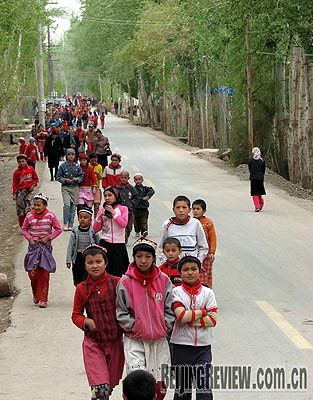|

INFRASTRUCTURE OVERHAUL: Primary students and their teachers from a village in Xinjiang Uygur Autonomous Region walk home. The regional government has invested over 10 billion yuan ($1.43 billion) on countryside road construction in the last five years
CHEN CHANGQI
Airport in Tibetan Community
The Civil Aviation Administration of China has approved a plan to build an airport in Gannan Tibetan Autonomous Prefecture of northwestern Gansu Province, the local government said.
The airport will have a 3,000-meter-long runway and construction is expected to be complete in 2010. Gannan has a population of 680,000.
The provincial reform and development commission said preparations will start soon to pave the way for the construction of Xiahe Airport, a 700 million yuan ($100 million) project.
Stable Food Prices
China can keep grain prices stable amid supply shortages and rising agricultural costs, said Zeng Liying, Deputy Director of the State Administration of Grain at an industry meeting.
She said China can ensure price stability thanks to abundant grain reserves. The demand-supply gap has narrowed from 50 billion kg in 2003 to 15 billion kg at present, boosted by four straight years of bumper harvests in major grain production bases, she said.
But she also admitted there is grain price rise pressure due to deficient supplies, soaring agricultural product costs and fluctuations on international futures markets.
Hot Money Rushing In
Speculative fund inflows into China are accelerating as investors bet on a stronger yuan and rising domestic interest rates, and these flows are putting pressure on the money supply and prices, an analyst for a state think tank warned.
The first-quarter speculative inflow exceeded $80 billion, compared with $120 billion for all of 2007, Zhu Baoliang, Chief Economic Analyst of the prediction department of the State Information Center, told an industry seminar recently.
Monthly inflows are running at triple 2007 levels, he said, and this trend is exerting pressure on the central bank to increase money supply, which could mean further inflation.
Zhu said earlier that massive speculative inflows had driven foreign reserves to a new high. The central bank said reserves grew by almost $154 billion in the first quarter and $35 billion in March alone.
Loosened Short-term Bonds
Chinese companies will no longer need the central bank's approval when issuing short-term bonds on the inter-bank market amidst government efforts to boost direct financing and reduce bank loan risks.
The People's Bank of China announced in a recent statement that non-financial companies could issue bonds with maturities of less than one year on the inter-bank market without its approval from April 15. Instead, they would only need to register at the National Association of Financial Market Institutional Investors set up in September.
It said other negotiable notes "with a certain maturity" issued by non-financial companies on the inter-bank bond market wouldn't need administrative examination and approval either. Nor would future innovative financing tools on the market.
Subprime Crisis Damage
The direct losses of Chinese banks from the U.S. subprime crisis were not especially large, Jiang Jianqing, Chairman of the Industrial and Commercial Bank of China (ICBC), said on the sidelines of the 2008 Boao Forum for Asia conference, which was held in south China's Hainan Province.
The ICBC, China's largest commercial lender, suffered a loss of $1.2 billion from the crisis, Jiang said.
Bank of China, the largest holder of sub-prime-related assets in the country, said last month in its annual report that its investment in subprime asset-backed securities was $4.99 billion in 2007. Some analysts had predicted the bank's losses could amount to $3 billion.
China Construction Bank, the country's major property lender, announced in its annual report it had made provisions of $630 million for possible losses in its $980 million sub-prime investments. | 